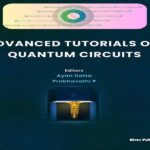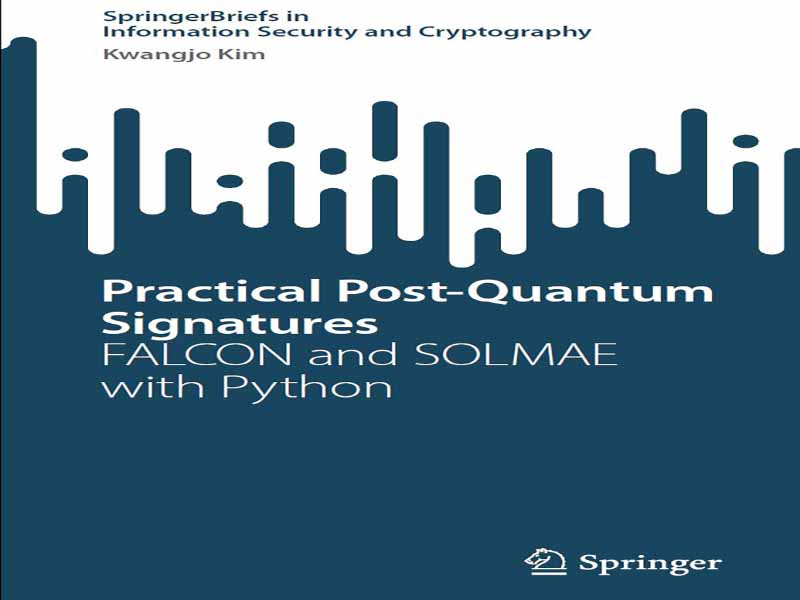- عنوان کتاب: Practical Post-Quantum Signatures – FALCON and SOLMAE with Python
- نویسنده: Kwangjo Kim
- حوزه: برنامه نویسی کوانتومی
- سال انتشار: 2025
- تعداد صفحه: 96
- زبان اصلی: انگلیسی
- نوع فایل: pdf
- حجم فایل: 4.74 مگابایت
روشهای امضای دیجیتال فعلی، مانند RSA (Rivest-Shamir-Adleman)، DSA (الگوریتم امضای دیجیتال) و ECDSA (الگوریتم امضای دیجیتال منحنی بیضوی)، از نظر درک ریاضی نسبتاً سرراست هستند. در حالی که فرآیندهای امضا و تأیید بسته به کلید مورد استفاده متفاوت است، زمان مورد نیاز برای این عملیات در بین این الگوریتمها تقریباً یکسان است. با این حال، در عصر محاسبات کوانتومی، روشهای رمزنگاری باید در برابر حملات کوانتومی کلاسیک فعلی و آینده دفاع کنند. دستیابی به این امر مستلزم درک عمیقتری از هندسه جبری، نظریه شبکه، نمونهبرداری گاوسی و تکنیکهای محاسبات چندجملهای کارآمد مانند FFT (تبدیل سریع فوریه) و NTT (تبدیل نظری اعداد) است که برای اکثر سیستمهای رمزنگاری مبتنی بر شبکه بسیار مهم هستند. الگوریتم FALCON که پس از هفت سال ارزیابی جهانی به عنوان فینالیست در پروژه استانداردسازی رمزنگاری پسا-کوانتومی (PQC) موسسه ملی استاندارد و فناوری (NIST) انتخاب شد، یک طرح امضای دیجیتال هش-و-علامت مبتنی بر مسئله شبکه NTRU (چندجملهایهای TRUncated درجه N) در چارچوب GPV است. در مقایسه با سایر امضاهای مقاوم در برابر کوانتومی مانند DILITHIUM و SPHINCS+، FALCON اندازه ترکیبی بسیار کوچکتری برای کلید عمومی و امضای خود ارائه میدهد. پس از انتشار FALCON، الگوریتم SOLMAE در سال 2021 معرفی شد. SOLMAE مانند FALCON، یک طرح هش-و-علامت دیگر است که در چارچوب GPV (Genry Peikert Vaikuntanathan) عمل میکند، اما فرآیند امضای پیچیده FALCON را سادهتر میکند. FALCON و SOLMAE هر دو در پایتون پیادهسازی شدهاند که درک و کار با آنها را در مقایسه با سایر زبانهای برنامهنویسی سطح پایین آسانتر میکند. برای افزایش درک عملکرد آنها، ما اسکریپتهای پایتونی توسعه دادیم که هر الگوریتم را گام به گام بررسی میکنند و نتایج و مفاهیم ریاضی زیربنایی را تجزیه و تحلیل میکنند.
این مونوگراف به عنوان یک کتاب درسی مقدماتی یا آموزشی برای دانشجویان کارشناسی و کارشناسی ارشد، متخصصان، مهندسان و هر کسی که به امضاهای دیجیتال پساکوانتومی علاقهمند است، عمل میکند. هدف این مطالب ارائه مفاهیم پیچیده رمزنگاری به شیوهای قابل فهم است.
The current digital signature methods, such as RSA (Rivest-Shamir-Adleman), DSA (Digital Signature Algorithm), and ECDSA (Elliptic Curve Digital Signature Algorithm), are relatively straightforward in terms of mathematical understanding. While the signing and verification processes differ depending on the key used, the time required for these operations is nearly the same across these algorithms. However, in the era of quantum computing, cryptographic methods must defend against both current classical and future quantum attacks. Achieving this requires a deeper understanding of algebraic geometry, lattice theory, Gaussian sampling, and efficient polynomial computation techniques like FFT (Fast Fourier Transform) and NTT (Number Theoretic Transform), which are crucial for most lattice-based cryptosystems.
The FALCON algorithm, selected as a finalist in the NIST (National Institute of Standards and Technology) Post-Quantum Cryptography (PQC) standardization project after seven years of global evaluation, is a hash-and-sign digital signature scheme based on the NTRU (N-th degree TRUncated polynomial) lattice problem, within the GPV framework. Compared to other quantum-resistant signatures like DILITHIUM and SPHINCS+, FALCON offers a significantly smaller combined size for its public key and signature.
Following FALCON’s release, the SOLMAE algorithm was introduced in 2021. Like FALCON, SOLMAE is another hash-and-sign scheme that operates within the GPV (Genry Peikert Vaikuntanathan) framework but simplifies FALCON’s complex signing process. Both FALCON and SOLMAE have been implemented in Python, making them easier to understand and work with compared to other low-level programming languages. To enhance understanding of their functionality, we developed Python scripts that examine each algorithm step-by-step, breaking down the results and the underlying mathematical concepts.
This monograph serves as an introductory or educational textbook for undergrad-uate and graduate students, practitioners, engineers, and anyone interested in post-quantum digital signatures. The material aims to present complex cryptographic concepts in an accessible manner.
این کتاب را میتوانید از لینک زیر بصورت رایگان دانلود کنید:
Download: Practical Post-Quantum Signatures





































نظرات کاربران